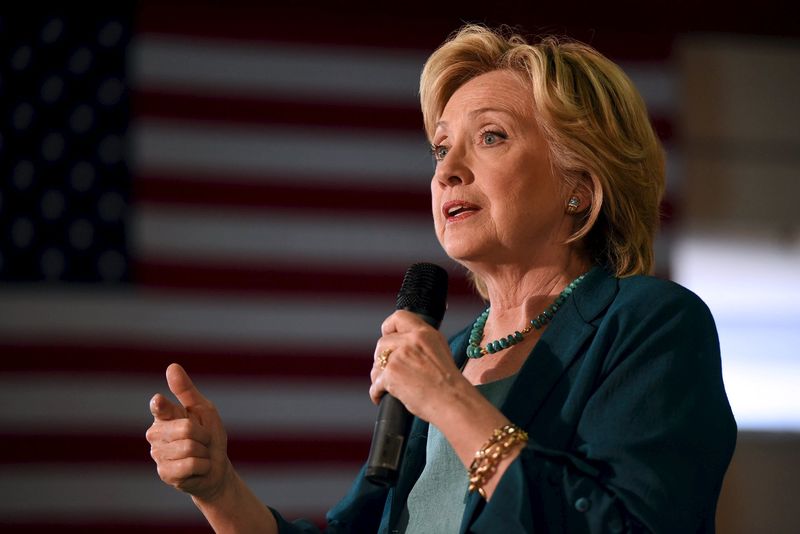By Jonathan Allen and Megan Cassella
NEW YORK/WASHINGTON (Reuters) - A hacking attack on Google's Gmail service in 2011 prompted Hillary Clinton and her aides to worry about the security of private email accounts widely used by government officials who found their "antiquated" government-issued laptops inefficient.
Clinton's use of a private email account connected to a server in her New York home while she led the
State Department now hangs over her campaign to become the Democratic nominee for the November 2016 presidential election.
The seemingly prophetic concern is revealed in the latest batch of Clinton's emails released by the State Department, the fifth release in a monthly series set to last until January 2016 under a schedule ordered by a federal judge.
After Google Inc (O:GOOGL) revealed in June 2011 that suspected Chinese hackers tried to steal the passwords of hundreds of Gmail accounts held by senior U.S. government officials, Clinton and three top aides discussed the issue.
"NO ONE uses a State-issued laptop and even high officials routinely end up using their home email accounts to be able to get their work done quickly and effectively," Anne-Marie Slaughter, who had recently left her job as director of policy planning at the State Department, wrote in an email to Clinton.
Slaughter suggested that someone outside of government write an op-ed about the State Department's "antiquated" technology, blaming it on budget cuts.
Clinton replied saying she thought the idea made "good sense" and asked how the department should follow up with Slaughter's idea.
Her chief of staff, Cheryl Mills, was less sure, writing that both she and policy aide Jake Sullivan had concerns.
Mills, who said hackers had attempted to infiltrate her email, wrote, "I am not sure we want to telegraph how much folks do or don't do off state mail (because) it may encourage others who are out there," Mills wrote.
The Republican National Committee, which has accused Clinton of jeopardizing sensitive government information and national security, picked up on the thread, saying it undercut Clinton's assertion that her server was more secure than government email.
MALWARE
Two months after that email exchange, Clinton received what appears to be ordinary spam. The emails purported to be a notice of a speeding violation from the New York State Department of Motor Vehicles.
The messages appeared to contain attachments that were used in a large-scale spam campaign that August 2011 news reports said spread malware that could give attackers control of infected systems.
It is unclear whether she opened the attachments, or even if they were part of that campaign. Spokesmen for Clinton, who has not driven herself in decades because of her Secret Service protection, did not respond to questions about the emails.
Brian Fallon, a Clinton spokesman, reacted with sarcasm on Twitter (NYSE:TWTR). "Breaking news: Clinton received spam," he wrote.
"Just by receiving a spam email, it doesn't mean you are infected," said Dan Guido, a former Federal Reserve cyber expert. Yet he said it would be impossible to determine what happened unless security professionals examined the original emails.
Clinton has apologized for her email arrangement, saying it was allowed but a bad idea.
Opinion polls show voters have lingering questions about her use of the private server, and her lead over top rival Bernie Sanders, a U.S. senator from Vermont, has dwindled amid the controversy.
MORE CLASSIFIED EMAILS
Among the 3,800 emails released on Wednesday were 215 that contain classified information that was redacted to protect national security, according to State Department spokesman John Kirby.
Three of them are now marked "secret," the second-highest level of classification, bringing the total number of classified emails in all the batches released so far to 403.
The government forbids transmitting classified information outside secure, government-controlled channels.
The State Department and other government agencies are currently arguing over how much of the information, if any at all, was classified at the time it was sent.
The Federal Bureau of Investigation is examining the server to see whether government information was mishandled.
As with previous batches, the latest emails include amusing glimpses into the quotidian business of an office job.
Clinton asked an aide how to turn her phone's ringer on, how to find local NPR radio stations and at one point complained about "fighting" with a White House telephone operator while trying to place a call.
Clinton also struggled with email addresses. In July 2011, after an aide politely pointed out that Clinton was writing to the aide's Gmail address instead her state.gov account, Clinton puzzled over the slip.
"I just checked and I do have your state (email address) but not your Gmail - so how did that happen," she wrote. "Must be the Chinese!"
